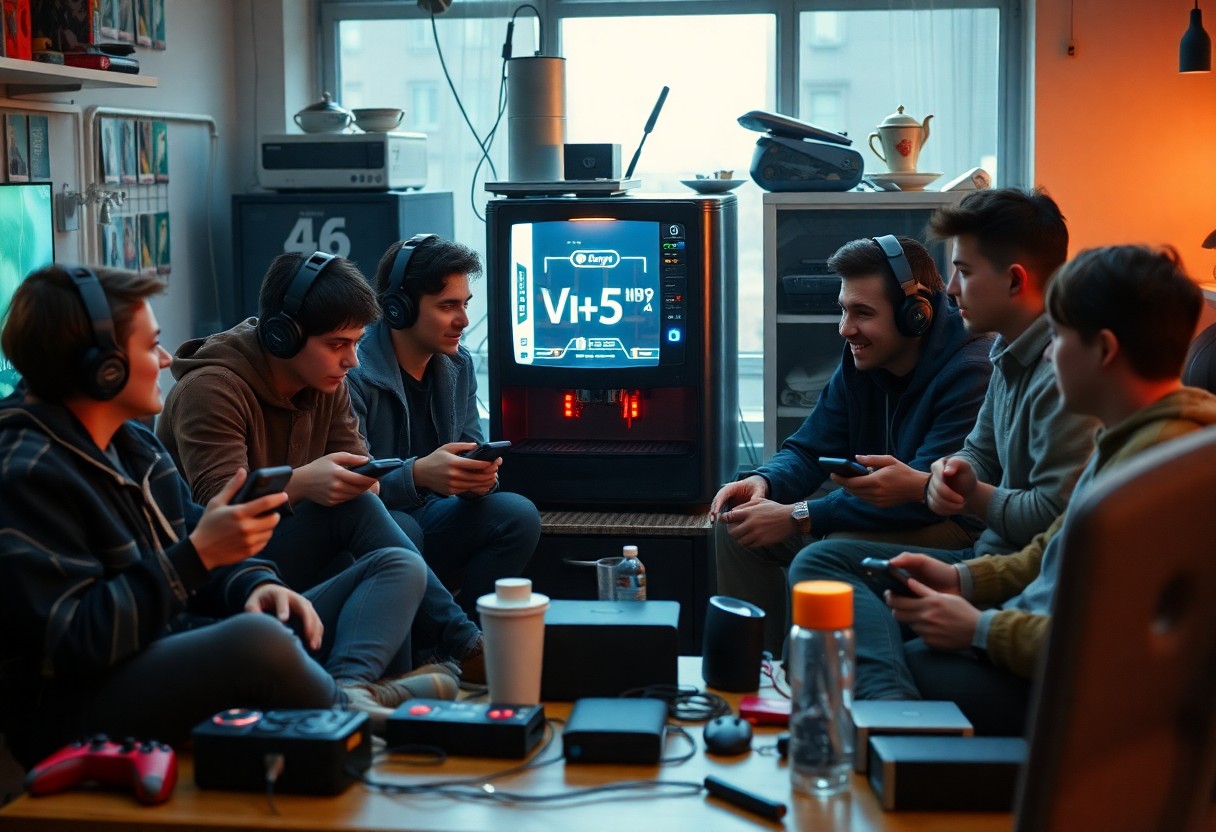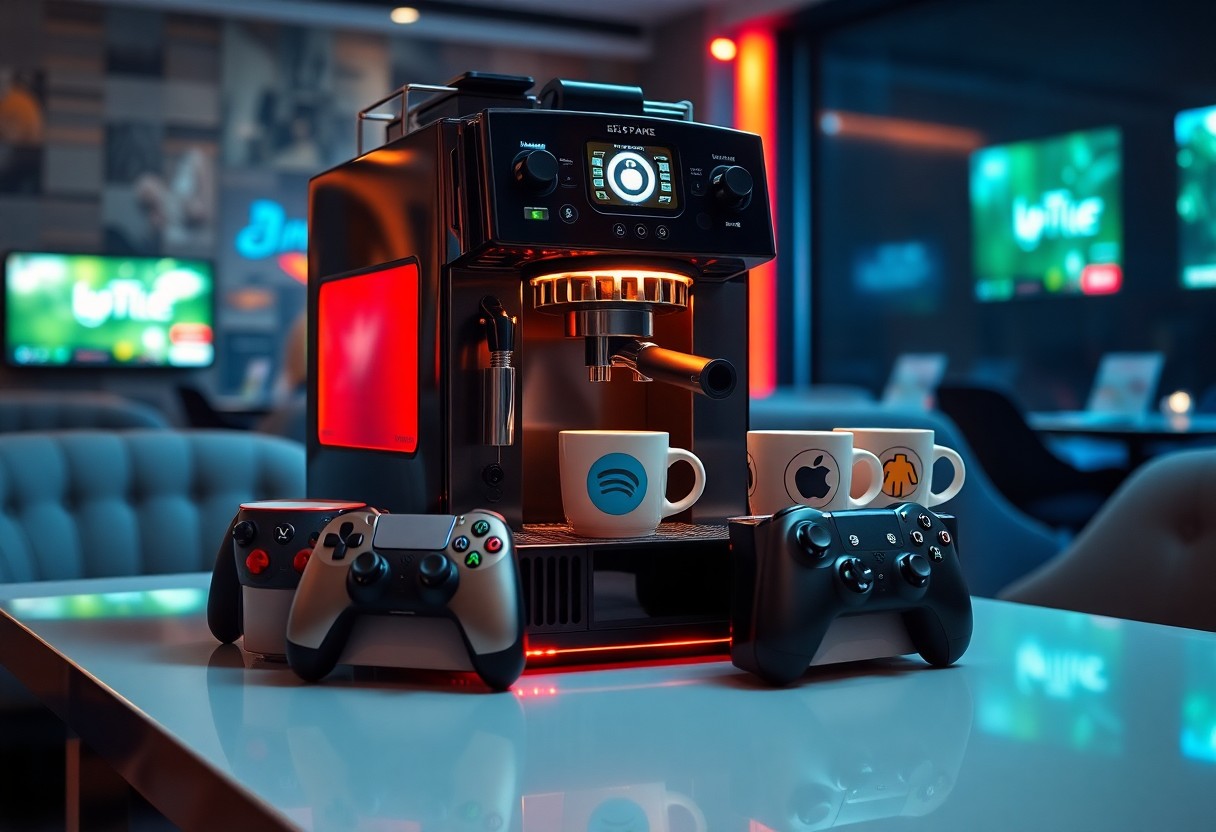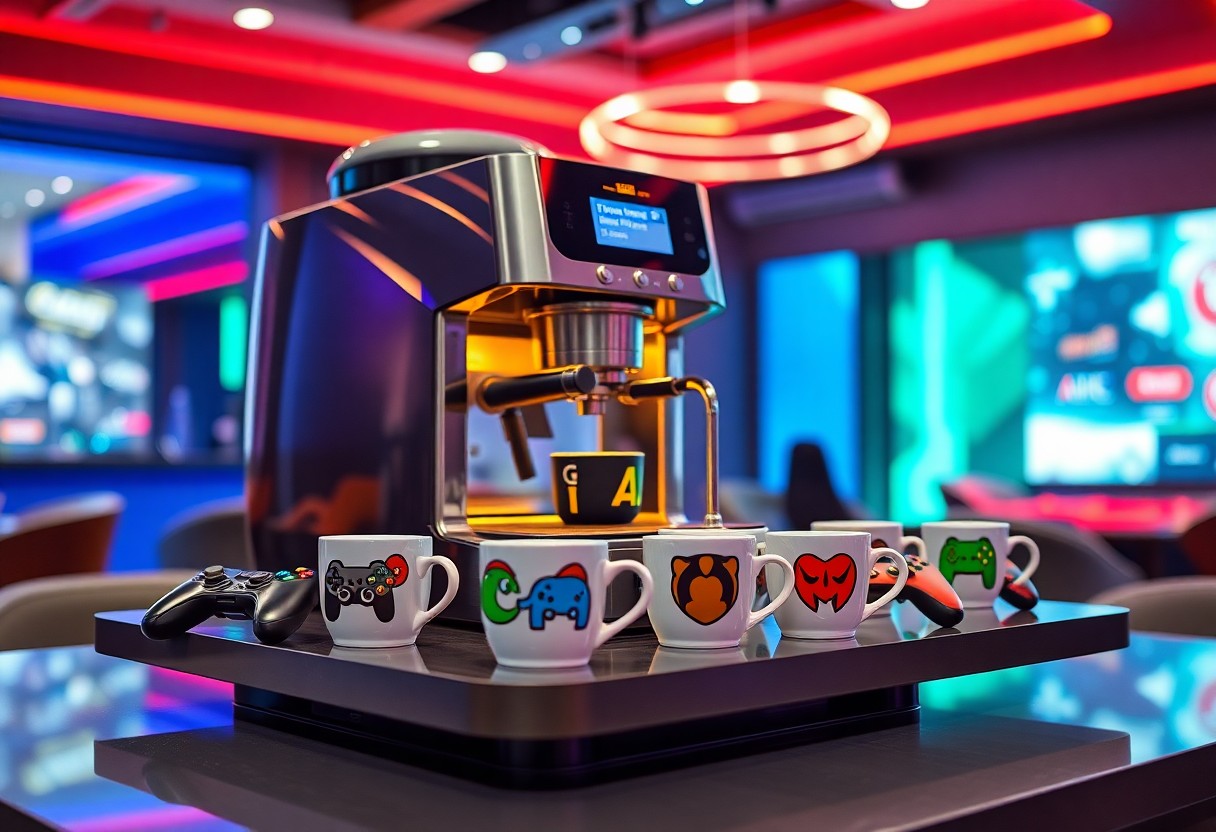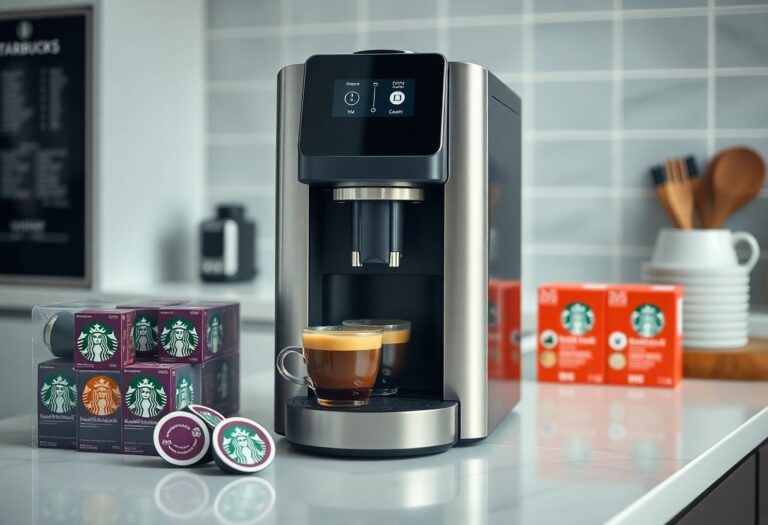What Word Describes Disagreement Anomalous Coffee Machine – Gaming Reference
Anomalous situations often arise in gaming, particularly when it comes to items like the *Anomalous Coffee Machine*. You might find yourself questioning the mechanics behind its features or performance. This post aims to clarify what word truly encapsulates this disagreement, guiding you through the intricate dynamics of gaming references while enhancing your understanding of these unique anomalies. With insightful analysis and key definitions, you’ll gain a stronger grasp of the fascinating worlds where coffee meets gameplay.
Key Takeaways:
- Understanding the term “disagreement” within the context of gaming can enhance the overall experience, particularly when discussing game mechanics or community interactions.
- The phrase “anomalous coffee machine” metaphorically highlights disruptions or unexpected outcomes, often paralleling unpredictable events in gameplay.
- Exploring different perspectives in gaming communities fosters richer discussions and collaborative problem-solving among players.
- The combination of terms suggests an examination of how players can approach conflicts constructively, rather than simply seeing them as roadblocks.
- Gaming references can serve as valuable tools for illustrating complex concepts like disagreement and anomaly, making them more relatable and engaging for audiences.
The Controversial Role of the Anomalous Coffee Machine in Gaming
The Anomalous Coffee Machine has polarized gamers, serving as both a quirky design element and a focal point for fiery debates. Its bizarre aesthetics, coupled with its unexpected functional attributes, have sparked conversations around creative freedom and the boundaries of game design. While some players embrace its eccentricity, others view it as a glaring example of the disconnect between developers and their audiences. This coffee machine not only brews beverages but also brews discontent, challenging perceptions of what constitutes quality in gaming environments.
Exploring the Origins of the Anomalous Design
The origins of the Anomalous Coffee Machine trace back to an indie developer’s bold attempt to inject humor into an otherwise serious game. Initially intended as an Easter egg, its unusual design emerged from a juxtaposition of traditional gaming aesthetics with absurdist elements. Players found themselves drawn into discussions not just about gameplay but about artistic expression in digital spaces. As word spread, curiosity about the machine grew, leading to an influx of creative interpretations and community-driven fan art.
How the Coffee Machine Became a Symbol of Discontent in Gaming Culture
The Anomalous Coffee Machine transitioned from a quirky detail to a controversial symbol within gaming culture, representing a broader tension between player expectations and developer intentions. Players began to scrutinize its existence, pointing to it as a reflection of perceived laziness or a gimmicky design choice. Many argue that it distracts from critical game mechanics and narrative depth, leading to an ongoing debate where the machine stands as a metaphor for dissatisfaction with the direction of contemporary game design.
This coffee machine, while initially a humorous aside, has evolved into a potent emblem of discontent among gamers. Its appearance in titles often prompts discussions about substance versus style, revealing player frustrations with superficial design choices overshadowing deep, engaging gameplay. The backlash stems from a collective sentiment—players yearn for immersive experiences and cohesive design, leading to the Anomalous Coffee Machine being scrutinized as a careless addition rather than a clever nod. As it continues to stir debate, it serves as a reminder of the balance developers must find between creativity and player engagement.
Disagreement as a Catalyst: Driving Innovation in Gaming Technology
In the dynamic world of gaming, disagreement often sparks innovation, leading to breakthroughs in technology and design. When developers and players engage in constructive dialogue about gameplay mechanics or equipment, it fosters an environment ripe for creative solutions. Disputes can lead to the revisitation of game elements, resulting in refined experiences that resonate more deeply with the community. For more insights, Here’s a Cheat Sheet. :: Anomalous Coffee Machine … highlights specific examples of this phenomenon.
The Impact of User Feedback on Design Evolution
User feedback plays a significant role in shaping video game design over time. Players’ critiques and suggestions provide vital insights that inform developers about preferences and pain points. When you share your thoughts on gameplay, it encourages developers to reconsider certain elements, often leading to enhanced features and improved player satisfaction. Engaging in this feedback loop not only strengthens the community’s voice but also propels innovation in gaming technology.
Case Examples of Equipment Controversies Leading to Stronger Performances
Notable controversies surrounding gaming equipment have often served as turning points for performance enhancements. In many instances, debates about balance between equipment effectiveness and fairness can prompt developers to rework mechanics, ultimately leading to a more equitable experience for all players. As players voice concerns over specific tools or strategies, development teams respond with adjustments that enhance gameplay dynamics, proving that disagreement can be a powerful driver of progress.
For instance, the discourse over specific weapons in popular shooters often catalyzes mid-season patches or updates, fine-tuning performance metrics to address concerns of overpowered capabilities. In the case of RPGs, when players express frustrations regarding particular character builds or gear sets, developers frequently introduce balance tweaks that not only satisfy the community but also elevate the overall gameplay experience. These case examples highlight how addressing such controversies can lead to innovations that redefine competitive integrity and drive game evolution.
Language of Discord: Terminology That Captures the Dissent
Engaging in the intricate web of gaming culture involves familiarizing yourself with the language of discord. Specific terminology captures the essence of disagreements, disagreements that can arise from gameplay strategies to narrative interpretations. Phrases like “toxic player,” “rage quit,” or “flame war” reflect not just conflicts but also attitudes within communities, revealing deeper tensions and alliances among players. Understanding these terms equips you to navigate debates effectively, enhancing your ability to express dissent while maintaining camaraderie.
Identifying Words and Phrases That Describe Disagreement in Gaming
The gaming lexicon is rich with expressions that exemplify dissent. Common terms like “griefing,” which refers to intentionally disrupting others’ gameplay, or “meta,” representing a popular tactic or strategy can convey the intensity of disagreements. You might encounter phrases such as “I disagree” being elevated to “I’m not a fan of that strategy,” indicating not just personal preference but also the potential for heated debate among the community.
The Power of Semantics: How Terminology Shapes Community Perception
Terminology in gaming does more than describe conflict; it actively shapes community dynamics. The phrases you choose can influence how others view a disagreement, framing it as either trivial or major. Using terms like “competitive” versus “overly aggressive” can create very different connotations of gameplay styles. Your choice of words can foster a more welcoming environment or contribute to division among players, highlighting the significant impact of semantics on community interactions.
When you opt for specific terms, you wield the power to cultivate a perception of inclusivity or divisiveness—consider how “varying opinions” sounds less confrontational than “polarizing views.” Research shows that communities thrive on positive language, with studies revealing that forums utilizing supportive terminology lead to lower conflict rates. Engaging constructively often requires you to reframe disagreements, promoting understanding rather than escalating tensions, thus helping to maintain a healthier gaming atmosphere.

The Psychological Perspective: Why Do Gamers Disagree?
Gamers often experience conflict not just over game genres or mechanics, but also due to their emotional attachments to gaming. These attachments stem from personal experiences and community interactions, leading to a mix of passion and frustration. With various gaming factions existing—ranging from console loyalists to PC enthusiasts—divergent perspectives flourish. This disagreement can be exacerbated by feelings tied to individual gaming experiences, which may influence your perception of the equipment and gameplay quality. For further insights on discrimination and its implications in various contexts, you can consult 28 CFR Part 35 — Nondiscrimination on the Basis of ….
Analyzing Emotional Responses to Gaming Equipment Failures
The frustration stemming from gaming equipment failures often amplifies emotional responses during play. Whether it’s a glitchy controller or a malfunctioning coffee machine, these technical failures can disrupt your immersion and provoke anger. These reactions are not just about the loss of gameplay but often represent a deeper investment in your gaming time and experiences, leading to heightened disagreements within the gaming community.
The Role of Community Identity in Fostering Debate
Your identity within the gaming community significantly shapes opinions and disagreements. Gamers frequently align themselves with specific brands, titles, or platforms, creating a sense of belonging that can lead to passionate debates. This camaraderie often extends beyond contentment with personal experiences and into defending collective values, such as fairness, inclusivity, and performance quality in gaming. The desire to uphold community standards fuels these disagreements, highlighting both competition and camaraderie in gaming culture.
Community identity plays a vital role in navigating disagreements, as you may find yourself in passionate discussions defending your platform of choice or gaming style. This shared identity fosters a sense of belonging, making you more likely to engage in debates over technical aspects or game merit. In many instances, your stances can shape collective narrative movements within larger gaming communities, such as console exclusivity or performance variances in gaming hardware. Such dialogues can ignite fierce loyalty but sometimes escalate into disagreements, revealing just how intertwined personal identity and gaming preferences are.

Bridging Divides: Strategies for Constructive Dialogue Among Gamers
Engaging in constructive dialogue among gamers requires intentional effort to address disagreements in a healthy manner. By fostering an open atmosphere where participants feel safe expressing their viewpoints, you can turn potential conflicts into opportunities for growth and learning. Encouraging empathy and active listening helps build understanding, allowing gamers to tackle differences in perspective and find common ground. This collaborative spirit not only enhances your community but also enriches your gaming experience.
Encouraging Collaborative Problem-Solving for Common Grievances
Fostering a spirit of collaboration when addressing grievances significantly reduces animosity among gamers. By organizing group discussions where everyone has a voice, you can jointly explore issues, brainstorm potential solutions, and develop a sense of shared responsibility for the community. This approach not only alleviates tensions but also empowers you to create a more inclusive environment, ultimately ensuring that all gamers feel respected and valued.
Best Practices for Moderating Discourse Surrounding Gaming Equipment
Effective moderation of discourse around gaming equipment demands an understanding of the diverse perspectives within the gamer community. Establishing clear guidelines that promote respectful communication can help maintain a constructive dialogue. Implementing regular check-ins with community members ensures that everyone is heard and their concerns addressed promptly. You might also consider having dedicated forums for specific issues, which allows gamers to share their experiences and solutions more easily, fostering collaboration rather than conflict.
Moderating discussions effectively requires vigilance and proactive engagement. Setting the tone with friendly reminders about the guidelines can prevent escalation and misunderstandings. When a conversation becomes heated, stepping in to diffuse tension with friendly prompts for clarification can help everyone regain focus on constructive solutions. Encourage participants to provide supporting data or their personal experiences, as this turn toward informed discussion cultivates a richer understanding between users, ultimately fostering a stronger, more cooperative community. By prioritizing healthy debates and learning experiences, you help create a space where disagreements become a catalyst for improvement.
Final Words
So, as you navigate through the unique concept of the ‘anomalous coffee machine’ in gaming, it’s necessary to recognize how disagreements can lead to innovative thinking and creativity. By considering various perspectives, you enrich your understanding of both gaming narratives and the mechanics that make them engaging. Embracing this multifaceted discourse allows you to foster deeper connections with the material, ultimately enhancing your overall gaming experience.
FAQ
Q: What does the term “anomalous” refer to in the context of a coffee machine used for gaming?
A: In this context, “anomalous” refers to unusual or unexpected behavior exhibited by the coffee machine when it interacts with the gaming setup. This could include malfunctioning features, unexpected brewing times, or coffee being brewed in varying flavors or strengths that don’t align with the preset options. This can lead to disagreements among users regarding the reliability and consistency of the machine’s performance during gaming sessions.
Q: How does disagreement about a coffee machine’s performance affect gaming experiences?
A: Disagreements about the coffee machine’s performance can lead to frustration among gamers, especially if the machine is a shared resource. If some players are satisfied with the drink quality and others are not, it can create tension within the group. Additionally, if the coffee machine malfunctions during critical gaming moments, it can distract players and detract from their focus and enjoyment of the game.
Q: What are common causes for disagreements when using a coffee machine during gaming sessions?
A: Common causes for disagreements can include differences in personal taste preferences, inconsistent brewing results, machine malfunctions, or disputes over usage times. Some players may prefer stronger coffee while others want a milder brew. Technical issues such as clogged filters or incorrect settings can further intensify these disagreements, making it important for players to communicate clearly about their coffee needs and expectations.
Q: Should we establish guidelines for using the coffee machine during gaming sessions?
A: Yes, establishing guidelines can help minimize disagreements and ensure a smoother experience for everyone involved. Guidelines could include designating specific times for machine use, agreeing on flavor preferences, or implementing a voting system for coffee choices. By having clear communication and understanding, players can enjoy their gaming sessions and coffee without unnecessary conflict.
Q: Can an anomalous coffee machine actually enhance the gaming experience?
A: While an anomalous coffee machine can lead to disagreement, it can also add an element of surprise that may enhance the experience for some users. Unique flavors or unexpected brewing outcomes can spark conversations and lead to creative gaming rituals or challenges. However, for the positive aspects to shine, it’s important to address and mitigate any frustrations that arise from its unpredictable behavior.







